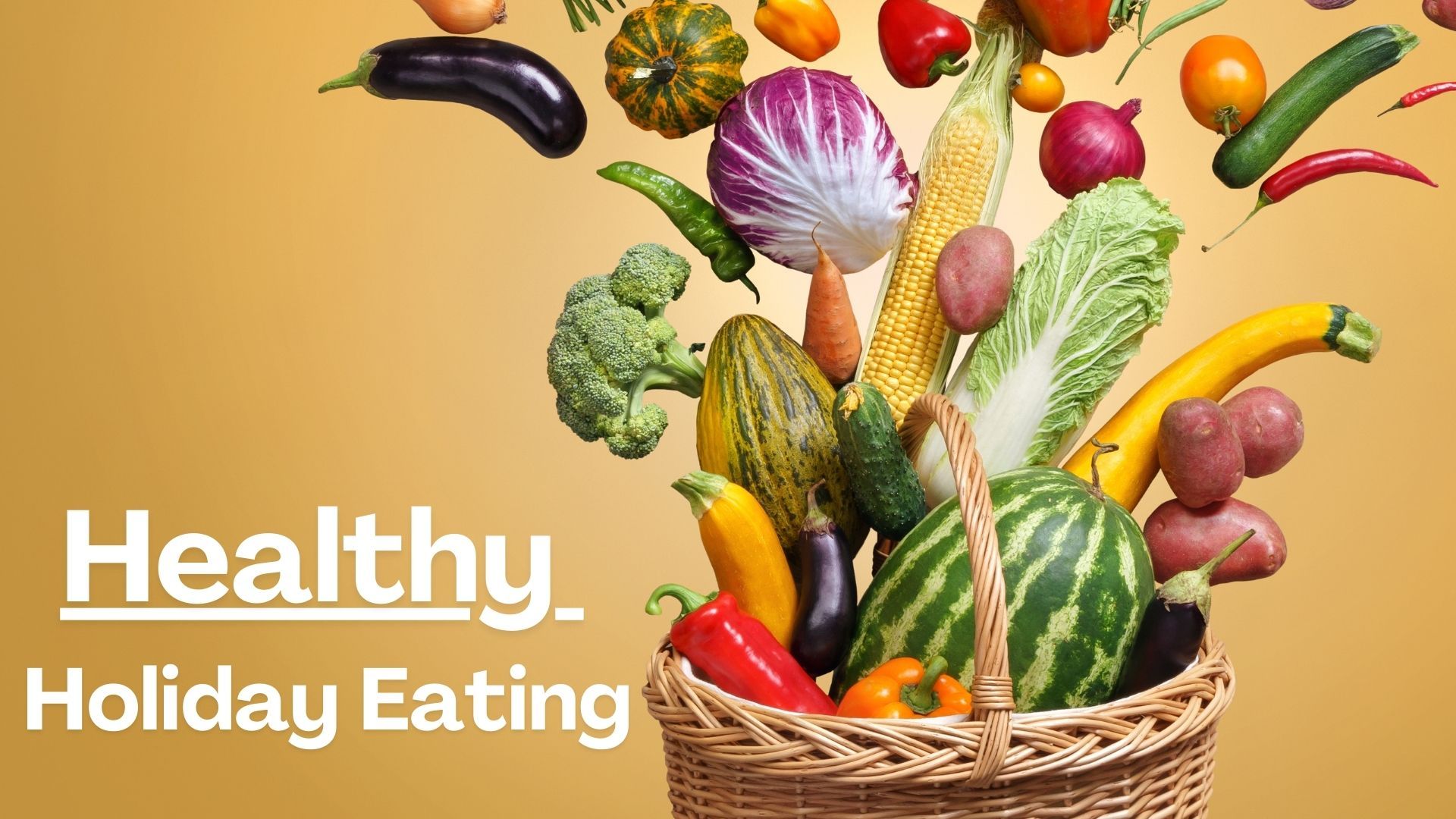How to Implement Healthy Holiday Eating Habits

Ahhh holidays…bringing us joy, laughter, family feasts, and…stubborn weight gain! It’s that time of the year again when holiday treats and sweets get the best of all of us, and maintaining healthy holiday eating habits seems like an impossible feat.
You may be following a certain exercise or diet regime throughout the year, but as soon as the holidays come around, all of your hard work seems to take a toll. Though it seems difficult during parties and family get-togethers, there are some ways to ensure healthy holiday eating by making some minor changes in your regular holiday routine.
But before we discuss these tips and tricks to staying healthy during the holidays, let’s first take a look at what types of things are included in an unhealthy holiday diet.
|
Navigate to where you want to go: 1. What is Unhealthy Holiday Eating? 2. What Constitutes as Healthy Holiday Eating? 3. What are Some Ways to Incorporate Healthy Foods During the Holidays? 4. What are Some Tips for Holiday Weight Management? 5. Conclusion |
What is Unhealthy Holiday Eating?
Of course, holidays are all about eating delicious food and being merry. That doesn’t, however, take into account the guilt that comes with eating food that we know will hurt our health journey in the upcoming year, and is in no way considered part of a healthy holiday eating plan.

So, what is this type of food that constitutes as part of an unhealthy holiday diet, you ask? Well, let’s first start with those refined sugar and refined flour treats that make up most of the holiday spread. This includes those sugar cookies, cupcakes, cakes, scones, donuts, brownies, and pies (to name a few) that become part of our regular holiday routine.
All of these sweet and delicious treats come with a price—one that can take months to pay off—since it’s often easier to gain weight than to lose it.
In addition to these, holiday diets often include a lot of junk food items that come with an abundance of preservatives, artificial colors/flavors, and concentrated sugars (i.e. processed meats, processed snacks, chips, sodas, sugary drinks, alcohol, caffeinated beverages, fried foods, oily/greasy foods, bacon, ham, pastries, candies, unhealthy desserts).
All of these make up a C.R.A.P. food diet (Concentrated sugars, Refined flour, Artificial colors/flavors, and Preservatives) that isn’t healthy at any time of the year, much less during a time when you’re unable to exercise as much due to festive commitments. And what’s the result of this unhealthy holiday eating? You’re left making new year’s resolutions all associated with detoxifying your body, eating healthy, and of course, trying desperately to lose the holiday weight.
So, what can you do to ensure healthy holiday eating habits to put yourself in a better position for the new year? Let’s take a look at some alternatives that can make an unhealthy holiday diet into a healthy one.
What Constitutes as Healthy Holiday Eating?
In order to truly transform an unhealthy festive diet into a healthy holiday eating plan, you have to ensure that you’re setting up healthful and flavorful alternatives that help effectively curb your cravings for the unhealthy foods.

Healthy eating habits during the holidays are often more challenging to cultivate than during the rest of the year, because unhealthy, delicious food is literally everywhere. Whether you’re working in offices or attending gatherings, the smells and flavors of festive junk food will follow you throughout the day.
Holiday diet, then, has to be intentional; you have to make conscious decisions about what you’re consuming throughout the festive season. Even though mindful eating during holidays seems challenging, it is achievable if you’re willing to make some small changes to your regular holiday routine.
For example, try to use healthier flour options like almond flour and oatmeal instead of all purpose flour (which is refined) when making your homemade desserts, and go for natural sugars like date sugar or honey for a natural sweetness, instead of using refined sugar.
Additionally, try to make homemade snacks using natural and wholesome ingredients, instead of buying processed junk food from a restaurant or grocery store to promote healthy holiday eating. For instance, making oven-baked kale chips is healthier than store-bought potato chips, and making healthy hummus or yogurt dip is better than eating high-calorie, fattening dips from the store.
Here is a delicious recipe for building a Holiday Charcuterie Board with Homemade White Bean Pumpkin Dip that is a must-try!
Above all, it’s important to brace yourself for your surroundings and embrace the goodness of the holidays. In other words, try to make healthy treats and sweets at home using natural ingredients and healthier alternatives, so you can still experience the flavors of the season without compromising on your health.
What are Some Ways to Incorporate Healthy Foods During the Holidays?
Incorporating healthy foods in your diet during the holidays is as difficult as it is detrimental. Your body needs healthy calorie-dense foods in the winter to ensure that it can keep you warm. So, you have to opt for healthy festive food that provides your body with the essential vitamins and nutrients and be creative in including wholesomeness in your holiday spread.

For instance, if you find yourself at a party or get-together where healthier options aren’t as readily available, then opt for smaller portions of the junk food and larger portions of any vegetables and/or fruits available. You can further control your portion sizes by using smaller plates and bowls, which will also prevent overeating.
Additionally, try to limit the processed foods at parties by choosing the minimally processed foods over the highly processed options. And drink lots of water to help curb your cravings, keep you hydrated, and support your overall digestion.
As for calorie-dense carbohydrates, try to opt for more whole grains than refined carbohydrates. And whenever possible, include more plant-based food items in your party meals to properly embrace healthy holiday eating. These will not only provide you with optimal energy, but will also be more beneficial for your gut health, weight management, and overall well being.
Ultimately, you want to aim for a more balanced diet that incorporates the 10-20-30 Rule for weight management (10g of fiber, 20g of healthy fats, and 30g of protein) to ensure that both your gut health and weight management are being taken care of with the foods you consume during the holidays.
What are Some Tips for Holiday Weight Management?
No matter how hard you try to keep your holiday spreads completely wholesome and healthy, there will be times when you find yourself feeling the weight of the season—both figuratively and physically. In those times, it’s important to stay motivated to keep off that stubborn holiday weight.

Here are some pointers that you can follow to help support your holiday weight management efforts:
- Walk after every meal: Taking a 10-15 minute walk after every meal balances your blood sugar levels, manages cortisol levels, and makes you feel more energized after the meal (rather than feeling sleepy).
- Exercise at least 30 minutes every day: When you exercise for 30 minutes every day, or at least 5 times a week, your body burns off excess fat. This will prevent any unhealthy holiday foods from becoming fat deposits in your body.
- Don’t slouch or lay down after meals: Slouching or laying down after meals contributes to weight gain, because you’re not using up the calories consumed as energy from the food you’ve eaten.
- Chart out a healthy holiday eating plan: In order to help you stay on track, list out the items that you will be substituting as healthy alternatives in your holiday diet. This list will help you take note of the types of foods you’re consuming throughout the season.
- Drink plenty of water: Not only will water help you stay hydrated, but it will also aid your digestion, especially if you’ve had salty or sugary foods. In fact, water will also help curb your salt and sugar cravings, which will ultimately prevent unhealthy snacking during the holidays.
- Make smart choices: When you’re at holiday parties or family gatherings, make sure you’re making smart decisions. such as limiting your intake of alcohol, processed items, and fattening foods. This will help you set yourself up for the new year.
- Focus on quantity and quality of sleep: Rest is often compromised during the holidays due to late night parties and get-togethers. Therefore, it’s important to get a good quantity and quality of sleep to avoid rising cortisol levels that will contribute to your weight gain (especially around the face and abdomen).
- Avoid overeating/stress-eating during holidays: Use smaller portions for unhealthy party food to avoid overeating at gatherings. In addition to this, make sure that you’re keeping your mental health in check to avoid stress-eating through the holidays.
- Try to eat healthy meals at home before parties: If you eat a filling healthy meal at home before heading out to holiday get-togethers, then you can avoid feeling stuffed with junk food. In other words, treat healthy homemade meals as your main course and unhealthy party food as the appetizers.
- Eat party food at appropriately spaced out intervals: You can limit the intake of party food by properly spacing it out throughout the evening. This way, you can enjoy delicious treats in moderation without feeling guilty of overeating.
Overall, make sure that you’re consciously aware of the food being consumed during parties and gatherings, so that you remain in charge of both your healthy holiday eating and your weight loss journey, even throughout the holidays.
Conclusion
Healthy holiday eating can be challenging, but it doesn’t have to be impossible. You just have to make small changes to your regular holiday routine to make sure that you remain in control of your health and wellness.

Essentially, aim for moderation in your consumption of festive food and focus your efforts on healthy alternatives (whenever possible), plant-based foods, getting enough sleep, hydration, and exercising daily to ensure that you’re burning off any excessive calories consumed.


